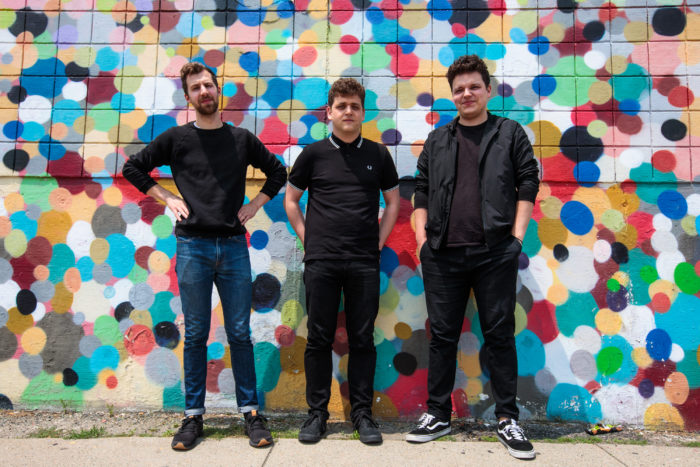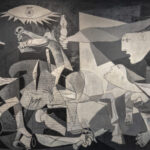Interview: Somos
Posted: by The Alt Editing Staff

Somos broke their three year long hiatus in earnest last month when they released Prison on a Hill early. The band’s third record dabbles in poppier and synthier tones, but mixes that with Michael Fiorentino’s most darkly political lyrics yet. We caught up with Fiorentino to talk about the process of writing and recording Prison on a Hill, as well as the inspiration between the record’s darker themes.
The album is currently available on Bandcamp through Tiny Engines, with all proceeds going to the Heather Heyer Foundation.
The Alternative: Obviously Prison on a Hill has been out for a while now. Have you been paying attention to the reception?
Michael Fiorentino: Yeah, reception seems to be pretty good. That’s a good feeling.
It’s quite different than your other material. It’s even more electronic than First Day Back was. How did that happen?
We’re always looking to explore expanding our repertoire and enhancing the songs as much as possible. I think it’s a natural progression as a band to end up where we are on this record. I think we tried a lot of the same things on First Day Back but the songwriting is a lot stronger on this record, so it worked out better.
Was there any worry coming off a hiatus with an album as different as this that fans might be less receptive?
Not really. Honestly, by the time we finished the record we were pretty confident it was a strong record. I didn’t really worry too much about how it would be received.
When were you writing this? I know you had “Permanently Lost” and “Strangers on the Train” that came out a few years ago, and I think “Dreamless” came out around that same time, if I remember. So was this all written around the same time?
“Dreamless” came out about six months after those two. We’ve just been writing nonstop since we announced the hiatus. We took a couple months off then started writing. It wasn’t entirely clear when we were gonna put a full-length out, but I guess we were essentially writing it about two years. A lot of songs that didn’t make the cut, a lot of revisions. We spent a lot more time on this one than the others.
So this wasn’t written to be a record then, you just wrote them along the way and made them into a record?
For the most part. There were three or four we wrote when we knew were were putting out a full-length on Tiny Engines and needed a couple more songs but yeah.
I know some releases of the record end with “My Way to You” and some have “New Blood” and “Dreamless.” What’s the deal with that?
Tiny Engines told us that we couldn’t fit all the songs on there. It would compromise the quality of the vinyl if we put all twelve songs on there. Those songs we wrote before Justin was writing with us and we planned on putting them on a single, like A side B side. They were kinda outside the record if that makes sense. They were written about a year before the album too.
Two of the things that stood out to me in lyrics were the references to exile. Obviously “Farewell to Exile” and then “Absent and Lost” has a line about living in exile. Almost every song too has a reference to war or violence or guns in some way. I was wondering why those two popped up so much throughout the record.
I think a lot of it has to do with the rise – and the way it affects everything – of authoritarianism in the United States and across the world. I was preoccupied with themes of creeping right-wing authoritarianism and imagining different dystopian future scenarios we might find ourselves under. With that you get things like violence and rage and frustration. I was thinking a lot about that. I was involved, politically, a lot with that and I think it spilled over into the record.
Another thing I was thinking about is the idea of migrants and the ways they’re treated, especially in Europe. There was that really striking photograph of the kid who washed up on the beach having drowned – the song “Mediterranean” is about that, themes of home and exile and the experience of migration.
And then “Farewell to Exile” is, if I’m reading correctly, about war?
Yes, or something like that. War, it’s like an otherworldly experience in that song. Someone’s returning and they’re very out of place.
This record is definitely your darkest lyrically, but probably also your poppiest and most accessible musically, and I think that makes for a really interesting juxtaposition.
One thing we were talking about is, the darker the song lyrically, we wanted to counterpose that with the poppier the song musically. We didn’t want the record to become too melodramatic or to take itself too seriously. We still wanted them to be pop songs and enjoyable to listen to. Combining that with the political undertones, I think, worked out well.
I was particularly interested in “Absent and Lost,” because that one seemed a little less specifically grounded than some of the others.
That one’s just about some sort of city or scenario in the future where there is the threat of some sort of looming crisis or catastrophe. I like the imagery of walking down these wide beautiful streets having the sense that something dramatically negative could happen. I just took it from there.
I was also curious about “My Way to You,” the closer. How was that one written?
It was written over a long period of time. Phil put together the intro, with the woodblock production and the synth, and then when I heard it I laid down that melody and those lyrics pretty much right then and it stuck. We didn’t really know what to do with that song because we were having trouble writing a chorus and transitioning the first minute and a half or so into a full song. We wrote the chorus for a different song, I think, but then realized it would work better on “My Way to You.” I think that’s my favorite song on the record, but it was definitely the most challenging to write.
Any other songs you want to highlight?
I think the song “Temporary Hope” is really good. We wrote that in like five hours. I really love that song, the melodies, the guitar work. I think it’s really driving. Another of my personal favorites on the record is “Young Believers.” Those to me are some of the standouts. I really like the strings and synth work on that one.
Obviously you’ve always been a leftwing band, and I believe you’ve written for Jacobin in the past. How did you come into your politics?
I feel I’m a little bit of an anomaly, ‘cause – in 2016, after Bernie Sanders, the DSA really blew up – I joined the socialist movement in like 2005 in high school. It was just sorta being exposed to the antiwar movement, and some people I knew were in the socialist movement, so I sorta fell into it young, when it was a very small and fringe movement. It’s been about fifteen years and I’m very happy it’s a much more potent force in American politics now.
If you were to go back and play Prison on a Hill for Michael back in 2014, how do you think he’d like it?
I think I’d be intrigued, then start to really like it. I honestly don’t listen to our music for enjoyment – I never really did, ‘cause I always felt like there were things were coulda done differently – but I’m so satisfied with how this one came out. I listen to it just to enjoy the music. I know that sounds maybe a little cocky, but I think I would immediately like it.
Is anything planned for Somos in the future, or are you just taking it step by step?
Step by step. We haven’t really even had that conversation, so right now we’re just in the moment, enjoying the reaction to the record.
—
Zac Djamoos | @greatwhitebison
The Alternative is ad-free and 100% supported by our readers. If you’d like to help us produce more content and promote more great new music, please consider donating to our Patreon page, which also allows you to receive sweet perks like free albums and The Alternative merch.










